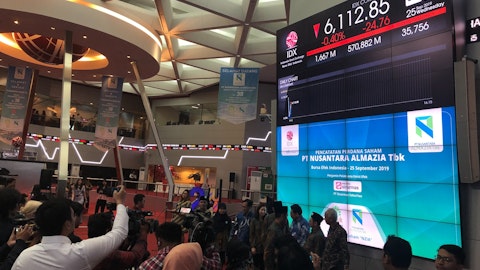Brian Meredith: Got you. And then second question, just going back to Global Housing. I’m just curious, what are you seeing right now from an inflationary perspective in that business, right? It sounds like it’s pretty modest given what your loss ratios are pretty good. But if I look at some of the other homeowners insurance companies, they’re still seeing a fair amount of inflationary pressure there. And maybe you can pivot that into maybe your business is a little bit different, and you’ve got better ways to control those that inflation than maybe some of the traditional homeowners companies?
Keith Demmings: Yes. So we definitely have still seen inflationary pressure. If we look at the Q3 results as an example, we did see higher severities year-over-year. We did see higher frequencies year-over-year. But because of the rate action that we’ve taken and the change with inflation guard on insured values, the premiums that we’re getting more than offset those increases from a claims perspective. So I’d say that’s largely why we’re outperforming in this market. And obviously, our team is doing a really good job, to Richard’s point, not just on the way we operate claims and the diligence that we work with, but the effort around expense efficiency. I mean if you think about Housing, we’ve scaled that business — and it really is a scale business.
We’ve scaled tremendously and our expenses — operational expenses are flat to down for the bulk of the Housing business. And overall, done a really good job on containing G&A, simplifying and focusing and driving a lot of digital initiatives to drive efficiency. So it’s a combination of 4 or 5 things that are coming together to lead to the outperformance. It’s not as simple as rate. It’s a lot of work across the board over the last 12 months-or-so.
Operator: [Operator Instructions]. Your next question comes from the line of John Barnidge of Piper Sandler.
John Barnidge: You talked about on the call consolidating mobile service centers to 2 areas. I believe you name check Texas and Tennessee, if I heard correctly. Both are low tax, previously low-cost states. Are there further opportunities into ’24 to move businesses or operations in cheaper areas in the U.S. that you’re considering?
Keith Demmings: Yes, I would say that we’re not actively considering any other relocations. If you think back to when we acquired HYLA. So go back to December 2020, we acquired HYLA. HYLA had a large facility in Nashville, Tennessee, and then Assurant had a facility in New York and a facility in Texas. And as we’ve looked at our business model, and we always wanted to have multiple sites for redundancy, certainly in operational resilience, but trying to get back to 2 sites, feels like a strategically the right thing to do for the business. And then looking at geographies where we feel like we’re really well positioned from a access to talent, from a logistics, access to clients, et cetera. So it’s really more about the strategic decision here than it is purely on a cost basis.
And it’s trying to have scaled facilities that we can make proper investments in and then obviously get access to the talent. So that’s what’s driving that change. And we will be actually scaling our facility in Nashville. We’re in the process of doing that work now. So we’ll be building a newer, more modern and significantly larger facility to support the long-term growth of that business.
Richard Dziadzio: I’d also just — that’s exactly right. Now I’d just add to that, too, is one of the other areas we’ve been getting some real estate efficiency, if I can put it that way, is on our corporate real estate. We have been either downsizing some of our offices or eliminating some of the offices. And that helps us from an expense base to that overall corporate expense that we have. So that’s another area that we’ve gotten some pretty good efficiency in, John.


